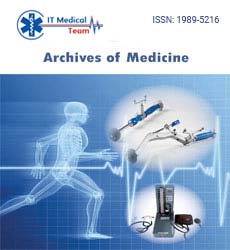Suresh Pathak*
National Health Service, United Kingdom
- *Corresponding Author:
- Suresh Pathak
National Health Service, United Kingdom
Tel: 0044 1708 726835
E-mail: skpathak137@aol.com
Received date: June 08, 2017; Accepted date: June 15, 2017; Published date: June 19, 2017
Citation: Pathak S. Mortar and Pestle. Arch Med. 2017, 9:3 doi: 10.21767/1989-5216.1000221
Copyright: © 2017 Pathak S. This is an open-access article distributed under the terms of the Creative Commons Attribution License, which permits unrestricted use, distribution, and reproduction in any medium, provided the original author and source are credited.
Keywords
Mortar; Pestle
Opinion
I was standing at my local pharmacy, waiting dispensing of my repeat prescription, suddenly my eyes were focused on the grand display of shining, sparkling mortar and pestle, which was placed in his show window, only as a decorative piece. The sight was eye catching and I also got the impression that it is for display only, has not been used at all in past and no possibility of its use in future. I was taken back to past, nearly half a century ago, when we had used it extensively for dispensing of various mixtures, emulsions and pastes. I clearly remember when we were in clinical year at the medical college in India, pharmacology and therapeutics was one of the subjects. Course work in this included practical training of making mixtures and various other dispensing items.
For making a mixture, pestle and mortar was a must. The commonest mixture used those days were, mist. Carminative, soda salicylic, and pot bromide. I always liked to make carminative mixture, grinding the pieces of soda bi carb in the mortar with pestle (this process is called trituration), transfer the grinded powder in to a beaker than add few drachms of Tincture cardamom, topped up with distilled water, this would bring the beautiful, pinkish red colour to the mixture, which was a joy to observe. I recall my demonstrator in pharmacy lab would shout in full stream “ triturate “ if he saw students relaxing or not concentrating in making of mixture.
This mixture was dispensed in clear glass bottle with cork and the schedule of dosages on the side of bottle, with instructions of frequency of dosage. The main indication of the use of this mixture is to cure indigestion and dyspepsia. Another favorite was Mixture magnesium trisilicate, a thick chalky appearing mixture, again an anta acid used for indigestion. Some of the patients thought it was more effective when few drachms of Tincture Card.co. was added to it.
I also recall that once I dispensed this mixture with reduced amount of Tincture Cardamom (which gives deep red colour), my patient refused to take it on the ground that it is not red enough so it will not be able to cure his indigestion. When hearing this I hastened to add few more drops of this Tincture, which not only got the eye catching red colour, but also the sparkle of joy on the face of the patient, as declaring that it will work now. Throughout my year in pharmacology, pestle and mortar was my constant companion. It gave me immense joy to use these in making mixtures and various dispensing items, which were admired by my pharmacy chief and subsequently by my patients, when I was a dispensing doctor for a short period in India.
I remember using Mixture Carminative when I entered in general practice in UK in early seventies. Regretfully the arrival of H2 antagonist, cimetidine and ranitidine has thrown my most famous RED MIXTURE in archives or in the show window of a pharmaceutical outlet. So where are the days gone, when we used to see the patient, listen to their complaint, make a clinical diagnosis and dispense the appropriate medicine. When you use the word dispense, of course pestle and mortar is not over looked.
Pestle and mortars have been used for many centuries to grind drugs and food items. It started as a big hollow in a rock. The Papyrus Ebers a famous Egyptian document, which lists remedies and cures for many diseases, infections and accidents mentions use of mortars as early as 1552 BC. By 1600 they become house hold objects for grinding and pharmacists used them in making medicines. The English word Mortar derives from Latin “Moratorium”, meaning receptacle for producing “products of grinding and pounding”. The classical Latin pistallium means, pounder, leading to English pestle. These are the early symbols of pharmacist and apothecary.
Pestle head is made of porcelain and the handle of wood, the commonest type. However various verities and modifications using stone and metals are mentioned in history books. But the classical mortar is of porcelain or heavy stone and pestle a combination of wood and porcelain, it is called Wedgwood pestle and Mortar.
Present or future generation of medicos will never know about these gadgets, which was a joy to handle, what it produces was effective cure for day to day ailments and gave all round satisfaction. My favorite The Red Mixture is a good example of that, and immediate cure this mixture offered. Today if you even whisper word indigestion, you will land yourself in G.I. unit of your local hospital awaiting gastroscopy!
19515






